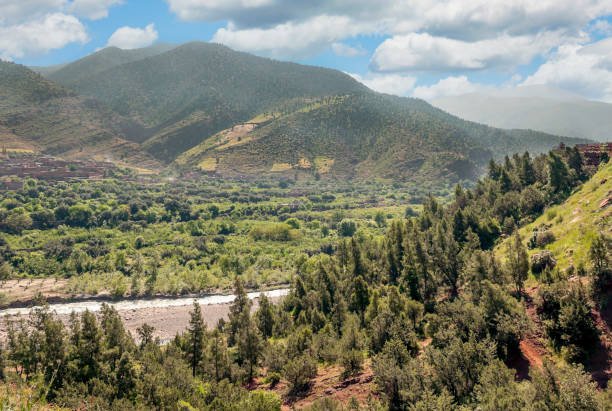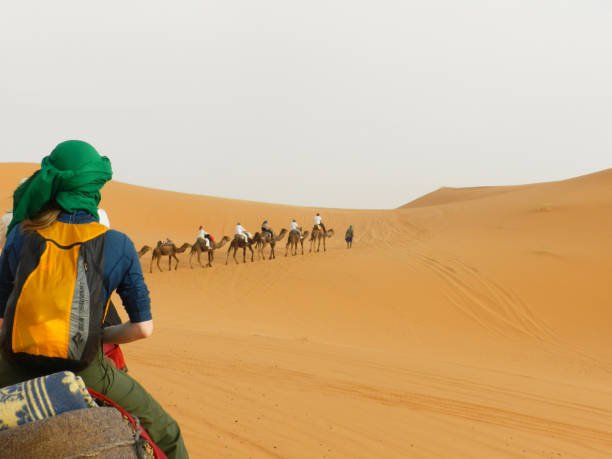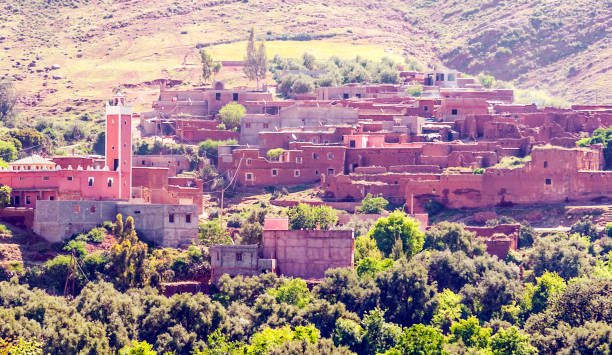High Atlas Mountain Treks
Rising in the center of Morocco, the High Atlas Mountains attract tourists and trekkers from all over the world, as it holds the possibility to explore beautiful landscapes, meet the Berber people, and undertake rather spectacular treks. These treks offer you everything, ranging from snowy mountains all over to the most beautiful valleys, and everything in between will make you wonder if it is real.
The Allure of High Atlas Mountain Treks
These models have not only become favorites amongst the outdoor people for good reasons. The comparatively challenging nature of the terrain has not been masked by ornate tourist advertising, but the villages, architecture, scenery, and general atmosphere will quickly make any hiker forget the long uphill climbs, steep descents, and rocky paths.
When going on High Atlas Mountain Treks, you will discover that you will be treading on paths that have been in use by the local Berber people for generations. This trail passes through the terrace farmland, virgin forest, and cliffs; it shows some glimpse of life on the mountain.
High Atlas Mountain Trek: Essentials
When you plan your High Atlas Mountain trek, make sure you do it with the right preparation. Due to climatic alterations and complications of the terrains of the region, necessary planning and equipment are required. Here are some essential tips to ensure a successful trek:
Physical Conditioning:
High Atlas Mountain Treks can also require a lot of energy physically; therefore, taking time to develop strength and endurance in the event will be significant when planning a trip. Endurance activities such as running and cycling and emphasis on muscular strength will assist one in coping with the climbing days as well as the long hike days.
Gear Selection:
Carry good-quality hike shoes, packed and layered-fitting clothes, and a good hiking sack. The weather in the High Atlas changes frequently, so make sure to dress in layers of clothing.
Acclimatization:
The majority of High Atlas Mountain Treks rise to exceeding 3 000 meters above sea level. Take time for acclimatization to avoid altitude sickness, but when hiking, avoid putting up a tent in the evening and move around at night.
Local Guide:
It can be advisable to hire a local guide that is well conversant with the High Atlas Mountain trail. A good example is that they can give you information about the region’s culture, history, and some of the best-kept secrets that you may never get to discover.
Some of the Most Traveled High Atlas Mountain Trails
The trekking routes of the High Atlas Mountains are diverse in their difficulty and do fit the interests of the traveler. Here are some popular options to consider:
Mount Toubkal Trek
Being the highest mountain in North Africa, Mount Toubkal attracts many tourists who would like to go through a quite tough undertaking. This high Atlas Mountain trek takes 2-3 days, and upon arrival, it holds spectacular views of other mountains and surrounding terrains. The path starts from the village of Imlil and passes through one valley to the other and up to the top, being at a height of 4,167 meters in Toubkal.
Mgoun Massif Circuit
For those seeking remoteness away from most frequented routes, then the Mgoun Massif circuit is perfect. This is an eight-day High Atlas Mountain trek hitting the off-the-beaten-track Berber villages, deep gorges, and high passes. The 5-7 day route also aims at offering tourists a view of the many plants, animals, and cultural sites, among others, in the region.
Ait Bougmez Valley Trek
Which is more popularly known as the ‘Happy Valley,’ is an off-beaten tourism destination located in the High Atlas Mountains. This mid-level hiking lets you get up and close with the Berber people through exposure to their homes in the gîtes and interactions with them. The jogging trails through the greenery in some parts of the hike and the historic kasbahs make this High Atlas Mountain hike a paradise for photographers.
Cultural Immersion on High Atlas Mountain Treks
The first strength of High Atlas Mountain Treks is that people can interact with the local Berber population as part of their leisure activity. It is advisable to agree with these indigenous people that have been living in the mountains for thousands of years, and they can be so hospitable to you.
When on the trek, one is usually afforded the opportunity to interact with the Berber people, who are amazing agriculturists and have arguably the purest culture in Morocco. Some High Atlas Mountain Treks offer homestays or nights in gîtes—real glimpses on the Moroccan mountains’ local way of life.
There is always an opportunity to familiarize yourself with Berber traditions, taste good local cuisine, and perhaps even try to speak Berber. Such cultural interactions turn out to become the highlight memories of High Atlas Mountain Treks.
It’s about Flora and Fauna of the High Atlas.
In the high Atlas Mountains there exists a number of plant and animal species, many of which are restricted to this area. As you traverse the various ecological zones during your High Atlas Mountain trek, keep an eye out for:
- Atlas Cedar: From the mountains, this majestic tree holds an important position in the ecosystem of the area.
- Barbary Macaque: These mischievous creatures are relatively easy to find in the forest area of the High Atlas.
- Golden Eagle: Chances to see these majestic birds flying over the rocks are possible for the lucky trekkers only.
- Atlas Mountain Viper: Despite being rarely sighted, this dangerous snake is endemic to the High Atlas.
The variation of flora that is observable as one proceeds up along the way in during High Atlas Mountain Treks makes the ecology of the mountain an interesting subject.
Responsible Trekking for the High Atlas
- Leave No Trace: Subdue all garbage from the show and reduce your footprint on the environment.
- Respect Local Customs: Do not take photos of people without permission, and do not go too close to anybody or enter their home without permission; cover sensitive body parts.
- Support Local Economies: Great care should be taken so as to hire local directors and relative establishments such as accommodation facilities.
- Conserve Water: Despite being in the mountains, water may be limited, so do not waste it as you go about your hiking.
By keeping those principles, future generations will also have the chance to do High Atlas Mountain Treks for many more years.
Conclusion
High Atlas Mountain Treks present you with an opportunity to be acquainted with the natural endowment, test your physical ability, and discover the social aspect of our culture that cannot be achieved in any other place. About both of these hikes, you can only say that they are unforgettable, while the beautiful views of the Ait Bougmez Valley as well as the impressive views of Mount Toubkal will stay with the tourist for a long time even after the descent from the top of the mountain.
FAQs:
When should one do a do a High Atlas Mountain Trek?
High Atlas Mountain Treks are best done between April and October. Summer consists of warm temperatures for travelers, but it hosts a larger number of tourists than the early summer and late summer. While the early summer and late summer are relatively cooler in temperatures than the summer, many tourists prefer to travel during this time.
Or do I need High Atlas Mountain Treks permits?
Many High Atlas Mountain Treks do not need permits to own a firearm. Of course it is advisable to consult the local authorities or a tour operator in the destination of your choice before traveling since the requirements can vary from time to time.



